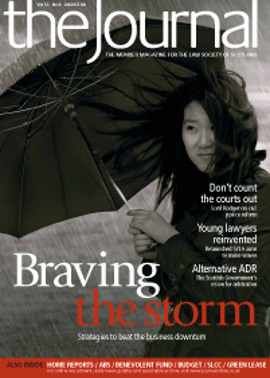The poor in our midst

The notion of lawyers or their dependants needing charitable support is not one that readily strikes a chord with the public. But Dunfermline solicitor Craig Bennet knows better than most about the hard times that fate can deliver to solicitors’ families.
Bennet, convener of the Scottish Solicitors’ Benevolent Fund for the past four years, is keen to raise the profile of the Fund at a time when, as he reported to this year’s Law Society of Scotland AGM, income has taken a dip such as to potentially call into question the Fund’s ability to maintain its current level of support to beneficiaries.
Varied circumstances
Typically these beneficiaries are the elderly widows, whether still in their own homes or in care, of now-deceased solicitors, whose assets include little if anything in the way of pension provision. For instance one, aged nearly 90, is in a retirement home supported only by the remaining proceeds of sale of her house. Another, younger but suffering from a heart condition, remains in her own home but has entered an equity release arrangement to secure enough to live on. A third lives on income support in a local authority house.
But fate can take an unkind turn for anyone. A solicitor in their 30s or 40s with a disabling medical condition, or even a combination of problems that prevent them working, can turn to the Fund, which has more recently found itself providing assistance in cases of this nature.
Craig Bennet believes that with stress and stress-related illness becoming more prevalent among younger solicitors, the profile of the average beneficiary could be changing. “I think applicants will come out of the woodwork and they’ll be younger ones, whether affected by stress or by drink or what not, I think that will come through.” He also suspects that the Fund still is not as well known as it might be, and that “a lot of people still don’t know the Fund exists – we’ve got to help people we don’t know about yet but who do need to be aware of the existence of the Fund”.
Making ends meet
The Benevolent Fund’s objects are simple enough: “to help in case of necessity solicitors, their widows and other dependants”. (One applicant is the son of a deceased solicitor who receives money to help him through his schooling.) In its present form it dates only from 1990, when separate funds in the care of the Scottish Law Agents Society (running from 1935) and the Law Society of Scotland (established with the Society in 1949) were merged. A Benevolent Fund Committee, made up of members of the two Societies, makes the major decisions affecting the Fund, and appoints the trustees who decide on grant applications and prepare the financial statements as required by charity law.
Grants are made twice a year. Applicants have to re-apply each time, but in most cases, as Bennet puts it, “they only go off the radar when they pass away. It’s very rarely that someone has a material change of circumstances for the better”.
Currently at £600 a time, the grants certainly are not riches, but to many of the beneficiaries they genuinely help them make ends meet.
With such long-term cases for assistance, the Fund has a particular need of a reasonably predictable income. However its recent financial statements show the annual level of donations (which come both from individuals and from local faculties of solicitors) fluctuating from around £9,000 in 2005, to over £12,000 in 2006, to under £4,200 in 2007 – a drop that well outweighed the rise in investment income from £9,270 to £10,442, and the money raised by the annual golf outing.
On the agenda
External factors can have a significant influence, reflecting Bennet’s view that the profile of the Fund needs to be maintained at a higher level. The rise in 2006 followed a mailing with the papers for the Law Society of Scotland’s AGM that year. This prompted substantial donations including £1,400 from a sole traders’ association in the west of Scotland which happened to be winding up at the time.
“There’s always somebody who has a particular amount of money at a particular time that they can give away, and that’s the sort of thing that we’re looking to catch on to”, Bennet adds, welcoming the fact that the Society has now agreed to send out a similar slip with the practising certificate renewal forms. He casts a somewhat envious eye at the police and health service, where small but mandatory deductions come off individual salaries each month to boost their equivalent finds, while accepting that this would be impractical for solicitors given the differing ways in which individuals are paid.
He does however put in a plea for local faculties and societies to add an item to their AGM agendas to cover the Benevolent Fund. The most regular donors – Highland, Perth & Kinross, Dunfermline, Dumbarton and Dundee – generally do this, and Bennet is keen for others to follow suit. “Once you get on to the AGM agenda faculties are very helpful, but it’s getting the Fund known and my big push for this year will be to get the Fund better known in local faculties who may like to contribute if they have a surplus from CPD activities or whatever. We want to get more people to know about it and then to have it on their agenda, that’s the important thing.”
Individuals too can play their part, and the trustees are always grateful to those who donate for example speaker’s fees, or even the odd £5 or £10 they decide they can spare – as well as the solicitor who gave £1,000 last Christmas.
If you can’t take a break
Ironically an important recent addition to the Fund’s income is the one it has most difficulty spending, because of the conditions attached. In 2006 the Tod Foundation offered to provide an endowment of £10,000 a year to defray the cost of short holidays (normally three or four days), to be taken in Scotland, for solicitors suffering from stress and in need of rest and recuperation. Similar schemes have been set up for doctors, ministers and artists, and the flexible terms offered extend to paying for locum cover for solicitors currently practising. Despite the perceived prevalence of stress in the profession, however, and the award being open to dependants, and the dependants of former solicitors, takeup to date has been low, at only four holidays so far.
“The money’s just pouring in and we can’t do anything with it”, Bennet comments. Fund trustees have identified two particular difficulties. Many of the existing beneficiaries are too infirm to take advantage of the offer; and solicitors currently in practice may be reluctant to disclose health or financial circumstances. Again, local faculties may have a role in communicating privately with possible beneficiaries to make them aware of the facility and encourage them to apply.
Threat of cuts
Funds from the endowment, of course, are not available for the ordinary support of applicants to the Benevolent Fund – which explains why the trustees will have to consider restricting the already modest grant, barring an increase in the level of ordinary donations. “We went up from grants of £500 a time to £600 three or four years ago, but we may have to go back again”, Bennet warns. “Last time it was agreed that three of the beneficiaries, whether because they had more cash or because their health wasn’t as bad as others, would be told that if the Fund income doesn’t increase, their grant next time would be reduced maybe by half.”
That would be a matter of great regret to the trustees. As Craig Bennet comments, “I think apart from the state, many of these people do not have any other form of income. Some of them apply to the Indigent Gentlewomen’s Society and things like that, but many of them don’t have that, and some of the letters we receive are heartwarming and sincerely thankful. Without that £600 twice a year, they’re toiling.”
Donations, and applications, to the Scottish Solicitors Benevolent Fund can be sent to the Secretary, Michael Sheridan, 166 Buchanan Street, Glasgow G1 2LW.
In this issue
- Where have we come from, where to next?
- Shifting sands
- A rank bad rule
- Braving the storm
- Civil justice: where next?
- Title Conditions Act: new registration procedures
- Young lawyers reborn
- Shining some more light...
- Power to the tribunal?
- Piece by piece
- The poor in our midst
- The Society's future role in complaints handling
- Appreciation: Lord Johnston
- Professional Practice Committee
- Facing the lean years
- It's a web 2.0 world
- Questions, questions
- Bare necessities
- Coming on the blind side
- Relocation, relocation
- Worse than the disease?
- Sleeping bounty
- Scottish Solicitors' Discipline Tribunal
- Website reviews
- Book reviews
- Industry standard
- Meet the committee
- What's in a motto?
- Leasing by example
- Good call?
- Home reports - the practice questions






